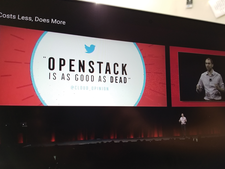OpenStack Summit Boston
Alive and Kicking

Contrary to rumors, OpenStack is far from dead.
Jonathan Bryce, the executive director of the OpenStack Foundation, kick-started OpenStack Summit Boston by quoting a tweet: "OpenStack is as good as dead." He was referring to the continuous flow of stories that OpenStack is losing momentum. He presented a fact-based counterargument demonstrating the continuous growth of OpenStack.
The Foundation conducts regular surveys to keep a tab on usage. According to the latest survey, OpenStack deployments have grown 44 percent year after year. Bryce said that more than 50 percent of Fortune 100 companies are running OpenStack. It's a global phenomenon. OpenStack is powering over five million cores of compute power, spread across 80 countries. And two-thirds of these deployments are in production.
Bryce cited some of the reasons behind this growth. One reason is the evolution of the ecosystem and usage beyond hyperscale public clouds. He called it the second generation of cloud where a new consumption model has popped up – the remotely managed private cloud. It allows companies of all sizes to consume OpenStack.
[...]
Buy Linux Magazine
Subscribe to our Linux Newsletters
Find Linux and Open Source Jobs
Subscribe to our ADMIN Newsletters
Support Our Work
Linux Magazine content is made possible with support from readers like you. Please consider contributing when you’ve found an article to be beneficial.

News
-
Another Linux Malware Discovered
Russian hackers use Hyper-V to hide malware within Linux virtual machines.
-
TUXEDO Computers Announces a New InfinityBook
TUXEDO Computers is at it again with a new InfinityBook that will meet your professional and gaming needs.
-
SUSE Dives into the Agentic AI Pool
SUSE becomes the first open source company to adopt agentic AI with SUSE Enterprise Linux 16.
-
Linux Now Runs Most Windows Games
The latest data shows that nearly 90 percent of Windows games can be played on Linux.
-
Fedora 43 Has Finally Landed
The Fedora Linux developers have announced their latest release, Fedora 43.
-
KDE Unleashes Plasma 6.5
The Plasma 6.5 desktop environment is now available with new features, improvements, and the usual bug fixes.
-
Xubuntu Site Possibly Hacked
It appears that the Xubuntu site was hacked and briefly served up a malicious ZIP file from its download page.
-
LMDE 7 Now Available
Linux Mint Debian Edition, version 7, has been officially released and is based on upstream Debian.
-
Linux Kernel 6.16 Reaches EOL
Linux kernel 6.16 has reached its end of life, which means you'll need to upgrade to the next stable release, Linux kernel 6.17.
-
Amazon Ditches Android for a Linux-Based OS
Amazon has migrated from Android to the Linux-based Vega OS for its Fire TV.

